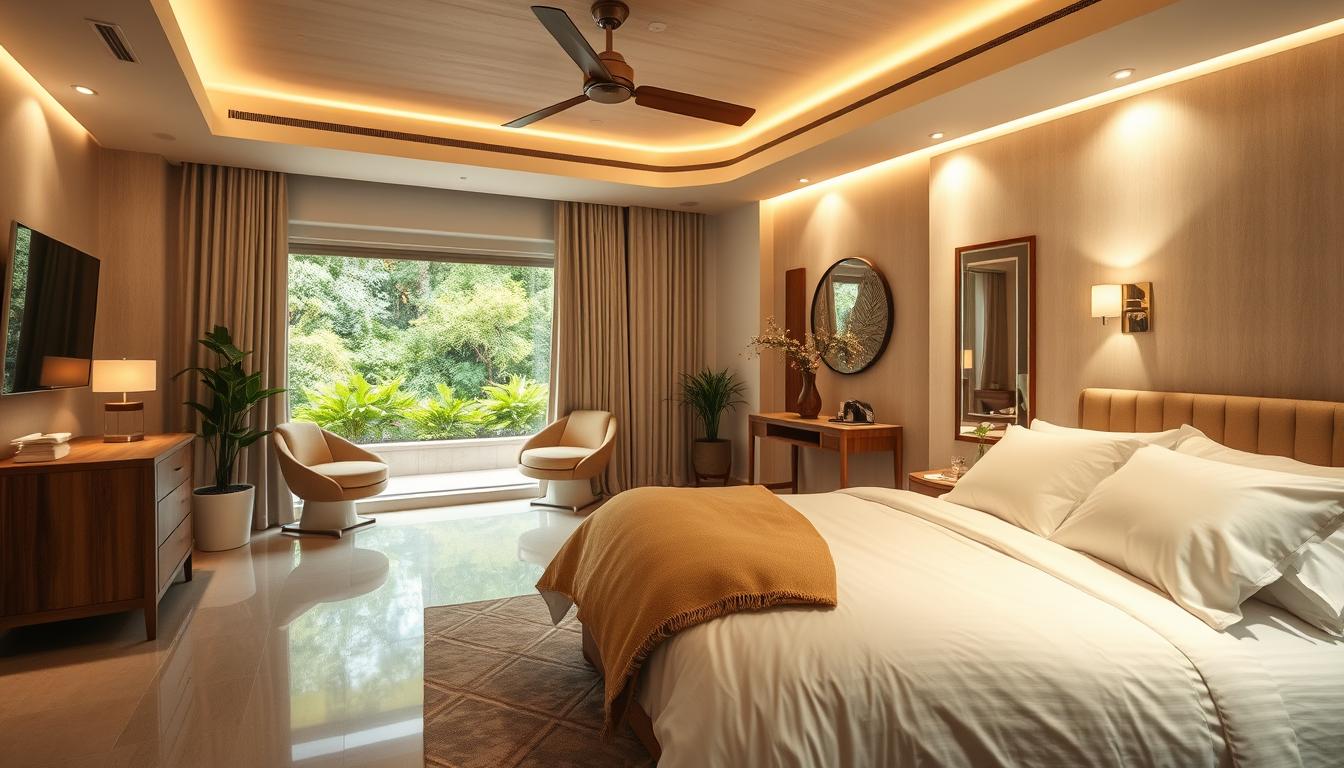
A private hospital room can significantly enhance your care experience, offering a quieter, more comfortable environment that fosters recovery. Studies have shown that patients in private rooms tend to have better outcomes and higher satisfaction rates compared to those in shared accommodations.
When it comes to choosing a hospital, the type of room you have can make a big difference. Private room hospitals provide a more personalized care experience, which can be particularly beneficial for patients requiring specialized treatment or those who value their personal space.
Our guide will help you discover the benefits of hospitals with private rooms and provide tips on finding the best facilities for your needs, ensuring a more comfortable and effective care experience.
The Benefits of Choosing Hospitals with Private Rooms
Opting for a hospital with private rooms can significantly enhance your overall hospital experience. Private patient rooms are designed to provide a more comfortable and personalized environment, which is crucial for recovery.
Enhanced Privacy and Dignity During Treatment
One of the primary advantages of private room hospital amenities is the enhanced privacy they offer. Patients can receive treatment and discuss their care with healthcare providers without being overheard, maintaining their dignity throughout the process.
Reduced Risk of Hospital-Acquired Infections
Private rooms also reduce the risk of hospital-acquired infections. By minimizing exposure to other patients and their germs, hospital accommodations with private rooms contribute to a safer care environment.
Improved Rest and Recovery Environment
A quieter and more peaceful environment is another benefit of private patient rooms. This setting allows patients to rest more effectively, which is essential for recovery. The comfort and tranquility of private rooms can lead to better patient outcomes.

How to Find Hospitals with Private Rooms in Your Area
Identifying hospitals that provide private rooms involves a multi-step process that includes online research, contacting hospital admissions, and understanding your insurance coverage.
Online Research Tools and Hospital Directories
Begin your search by utilizing online hospital directories and healthcare review websites. These platforms often provide detailed information about hospital facilities, including the availability of private rooms. You can filter your search based on location, insurance provider, and specific medical needs.
Some popular online resources include:
- Healthgrades
- Leapfrog Hospital Safety Grade
- Medicare’s Hospital Compare
Questions to Ask When Calling Hospital Admissions
When contacting hospital admissions, it’s crucial to ask the right questions to ensure you get accurate information about their private room options. Some key questions to ask include:
- Availability of private rooms
- Amenities offered in private rooms
- Any additional costs associated with private accommodations
Working with Your Insurance Provider
Understanding your insurance coverage is vital when seeking a hospital with private rooms. Contact your insurance provider to determine the extent of your coverage for private hospital accommodations.
| Insurance Provider | Coverage for Private Rooms | Additional Out-of-Pocket Costs |
|---|---|---|
| Medicare | Limited coverage; typically not covered | High |
| Private Insurance | Varies by policy; some cover part of the cost | Variable |
| Medicaid | Generally not covered | High |
Top-Rated Hospitals with Private Rooms Across the United States
From academic medical centers to community hospitals, the U.S. offers a range of top-rated hospitals with private rooms. These hospitals provide patients with luxury hospital rooms and private hospital suites, ensuring comfort and high-quality care.
Academic Medical Centers with Private Accommodations
Many prestigious academic medical centers offer private rooms equipped with the latest medical technology. For instance, hospitals like Johns Hopkins and Mayo Clinic provide state-of-the-art facilities and personalized care.
Community Hospitals Offering Private Rooms
Community hospitals also offer private rooms, often with a more personalized touch. Examples include hospitals like NewYork-Presbyterian and Cedars-Sinai, which offer a range of private accommodations.
Specialty Hospitals and Private Care Options
Specialty hospitals focus on specific areas of healthcare, offering private rooms tailored to particular needs.
Maternity and Women’s Health Facilities
Hospitals like Brigham and Women’s Hospital offer private maternity rooms with advanced care options.
Cancer Treatment Centers
Cancer centers, such as MD Anderson Cancer Center, provide private rooms for patients undergoing treatment.
Rehabilitation Hospitals
Rehabilitation hospitals, like Rehabilitation Institute of Chicago, offer private rooms to support recovery.
These top-rated hospitals with private rooms demonstrate a commitment to patient comfort and care. When choosing a hospital, consider the benefits of private room hospitals and luxury hospital rooms for a more personalized experience.
Understanding Different Types of Private Room Accommodations
Private room accommodations in hospitals are not one-size-fits-all, offering various options to suit different needs. The type of accommodation chosen can significantly impact a patient’s comfort and recovery experience.
Standard Private Rooms vs. Deluxe Suites
Standard private rooms provide a quiet and private space for patients, typically equipped with a bed, monitor for vital signs, and basic amenities. Deluxe suites, on the other hand, offer more luxurious accommodations, often including additional space, a sofa bed for visitors, and upgraded amenities such as flat-screen TVs and minibars.
Specialty Private Rooms for Specific Conditions
Some hospitals offer specialty private rooms designed for patients with specific medical conditions. For example, rooms equipped with advanced life support systems or isolation rooms for infectious disease patients. These rooms are tailored to provide the necessary care and precautions for the patient’s condition.
Extended Stay Private Room Options
For patients requiring longer hospital stays, extended stay private rooms are available. These rooms are designed to provide a more homely environment, with amenities such as kitchenettes, larger bathrooms, and sometimes even laundry facilities.
| Accommodation Type | Amenities | Typical Use |
|---|---|---|
| Standard Private Room | Basic amenities, monitor for vital signs | General medical care |
| Deluxe Suite | Upgraded amenities, sofa bed, TV | Patients seeking more comfort |
| Specialty Private Room | Advanced life support, isolation facilities | Specific medical conditions |
| Extended Stay Room | Kitchenette, laundry facilities | Long-term hospital stays |
Cost Considerations for Hospital Private Rooms
When considering a hospital stay, understanding the cost implications of private rooms is essential. Hospital private rooms offer a more comfortable and private environment, but their costs can be significantly higher than shared accommodations.
The financial aspect of choosing a private room involves several factors, including insurance coverage, out-of-pocket expenses, and available financial assistance.
Insurance Coverage for Private Accommodations
Most health insurance plans cover the cost of hospital stays, but the extent of coverage for private rooms varies. Some insurance providers may cover the full cost, while others may only cover a portion, leaving patients with out-of-pocket expenses.
Average Out-of-Pocket Expenses
Out-of-pocket expenses for private hospital rooms can vary widely depending on the hospital, location, and insurance coverage. On average, patients can expect to pay a daily copay or a percentage of the total hospital bill.
Financial Assistance and Payment Plans
For patients facing high costs, many hospitals offer financial assistance programs or payment plans to help manage expenses. It’s essential to discuss these options with hospital billing staff.
| Cost Component | Average Cost | Insurance Coverage |
|---|---|---|
| Daily Room Rate | $1,000 – $2,000 | Varies by plan |
| Out-of-Pocket Expenses | $100 – $500 per day | Depends on copay/coinsurance |
Luxury Amenities in Hospitals with Private Rooms
The modern hospital experience is being redefined with luxury amenities in private rooms. Hospitals are now focusing on providing more than just medical care; they’re creating an environment that fosters healing and comfort.
Technology and Entertainment Features
Many luxury hospital rooms come equipped with advanced technology and entertainment features. These can include large-screen TVs, complimentary Wi-Fi, and even tablet computers for patients to stay entertained or work during their stay.
Visitor Accommodations and Overnight Options
Private hospital suites often include comfortable visitor accommodations, such as sleeper sofas or even separate guest rooms. Some hospitals also offer overnight stays for family members, making it easier for loved ones to be close to the patient.
Dining Services and Personal Comfort Amenities
In terms of private room hospital amenities, dining services have seen significant upgrades. Patients can enjoy personalized meal plans, and some hospitals even offer room service. Additionally, amenities like plush bedding, aromatherapy, and spa services are becoming more common, enhancing the overall comfort of the hospital stay.
These luxury amenities are transforming the hospital experience, making luxury hospital rooms a preferred choice for many patients. By combining advanced medical care with comfort and convenience, hospitals are setting a new standard in patient care.
How to Request and Secure Private Hospital Rooms
Securing a private hospital room requires some planning and knowledge of the process. To get started, it’s essential to understand the steps involved in requesting a private room.
Advance Planning with Your Healthcare Provider
Advance planning is crucial when it comes to securing a private hospital room. Discussing your preferences with your healthcare provider early on can significantly improve your chances of getting a private room. Your healthcare provider can provide guidance on the availability of private rooms and help facilitate the request process.
Day-of-Admission Strategies
On the day of admission, having a clear plan can help secure a private room. Arriving early and being prepared to discuss your preference for a private room with hospital staff can make a difference. It’s also beneficial to have your insurance information readily available to avoid any delays.
Special Considerations During Infectious Disease Outbreaks
During infectious disease outbreaks, hospitals may have specific protocols in place for isolating patients. In such cases, private rooms may be more readily available for patients who require isolation. Understanding these protocols and communicating with your healthcare provider can help in securing a private room when it’s most needed.
By being informed and proactive, patients can increase their chances of securing a private hospital room, enhancing their comfort and recovery experience.
Conclusion: Making the Most of Your Private Room Hospital Stay
Having a private room during your hospital stay can greatly enhance your comfort and care. By understanding the benefits of private rooms, knowing how to find hospitals with private rooms, and being aware of the costs and amenities involved, you can make the most of your hospital stay.
When selecting a private room hospital or private healthcare facility, consider factors such as insurance coverage, out-of-pocket expenses, and the level of care provided. By being informed and planning ahead, you can ensure a comfortable and supportive environment during your recovery.
Whether you’re seeking a standard private room or a deluxe suite, being aware of your options and knowing how to request the accommodations that best meet your needs can make a significant difference in your hospital experience.
FAQ
What are the benefits of staying in a private room hospital?
Staying in a private room hospital offers numerous benefits, including enhanced privacy and dignity during treatment, reduced risk of hospital-acquired infections, and a more peaceful and restful environment, which is essential for recovery.
How do I find hospitals with private rooms in my area?
You can find hospitals with private rooms in your area by using online research tools and hospital directories, calling hospital admissions to ask about their private room options, and working with your insurance provider to understand your coverage options.
What types of private room accommodations are available in hospitals?
Hospitals offer various types of private room accommodations, including standard private rooms, deluxe suites, specialty private rooms for specific conditions, and extended stay private room options, each with different amenities and services.
Are luxury amenities available in hospitals with private rooms?
Yes, many hospitals with private rooms offer luxury amenities, such as advanced technology and entertainment features, comfortable visitor accommodations, and personalized dining services, to enhance the patient experience.
How do I request and secure a private hospital room?
To request and secure a private hospital room, it’s essential to plan ahead with your healthcare provider, consider day-of-admission strategies, and be aware of special considerations during infectious disease outbreaks.
What are the cost considerations for hospital private rooms?
The cost of hospital private rooms varies, and it’s essential to understand your insurance coverage, average out-of-pocket expenses, and financial assistance options to plan and budget for your hospital stay.
Can I get a private room in a specialty hospital, such as a cancer treatment center or rehabilitation hospital?
Yes, many specialty hospitals, including cancer treatment centers and rehabilitation hospitals, offer private rooms, and some even have luxury amenities and specialized care options.



![Maternity Ward at [Hospital Name] – Exceptional Care](https://zyplin.com/wp-content/uploads/2025/06/fe0f7353-210f-4c41-be1a-1f81eae63528.jpg)

